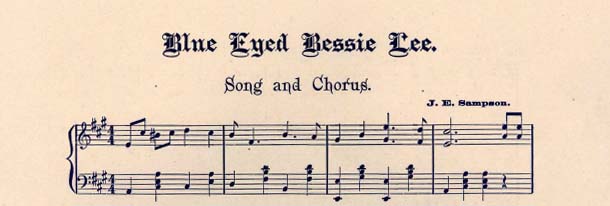
Historic Sheet Music Collection
Document Type
Score
Publication Date
1919
Lyrics
Willie Earl met a sweet young girl one day in France,
Her naughty little glance, put Willie in a trance;
Willie Earl couldn't understand her talk you see,
He only knew two words in French
That he learned in the trench,
They were "oo-la-la" and "wee-wee."
They would spoon beneath the moon above
It was fun to hear them making love.
Chorus
She'd say "compronay voo, papa?"
and he'd say "oo-la-la! wee-wee"
She'd smile and whisper "mercy bacoo"
He'd answer "I don't mind if I do"
She'd say if you be my papa" then I will be your macherie
She'd pinch his cheek and say "you keskasay:
He'd say "Not now, dear, but later I may;"
Then she'd say "compronay voo, papa?"
and he'd say "oo-la-la! wee-wee."
Willie Earl said, "this little girl is meant for me,
No more I'll cross to the sea,
I'll stay in Gay Paree.
Ev'ry day you would hear him say to his babee,
"Your talk I do not know, but I,
Will manage to get by, with my "oo-la-la" and "wee-wee"
Ev'ry ev'ning Willie would rehearse
Instead of getting better he got worse
She'd say "compronay voo, papa?"
and he'd say "oo-la-la! wee-wee"
She'd say "come see" and then roll her eyes,
He'd answer, "baby you'd be surprised."
Each ev'ning they would promenade,
upon zeboulevarde you see;
One day at lunch she said "cafe voola"
He said "my dear, don't forget where you are;"
Then she'd say "compronay voo, papa?"
and he'd say "oo-la-la! wee-wee."
Recommended Citation
Ruby, Harry and Jessel, George, "And He'd Say "Oo-La-La-Wee-Wee"" (1919). Historic Sheet Music Collection. 99.
https://digitalcommons.conncoll.edu/sheetmusic/99
The views expressed in this paper are solely those of the author.
Comments
By Harry Ruby and George Jessel
Copyright MCMXIX by Waterson, Berline & Snyder, Co.
Copyright Canada, MCMXIX by Waterson, Berlin & Snyder, Co.
International Copyright secured
Some of these resources may contain offensive language or negative stereotypes. Such materials should be seen in the context of the time period and as a reflection of the attitudes of the time. The items are part of the historical record, and do not represent the views of the libraries or the institution.